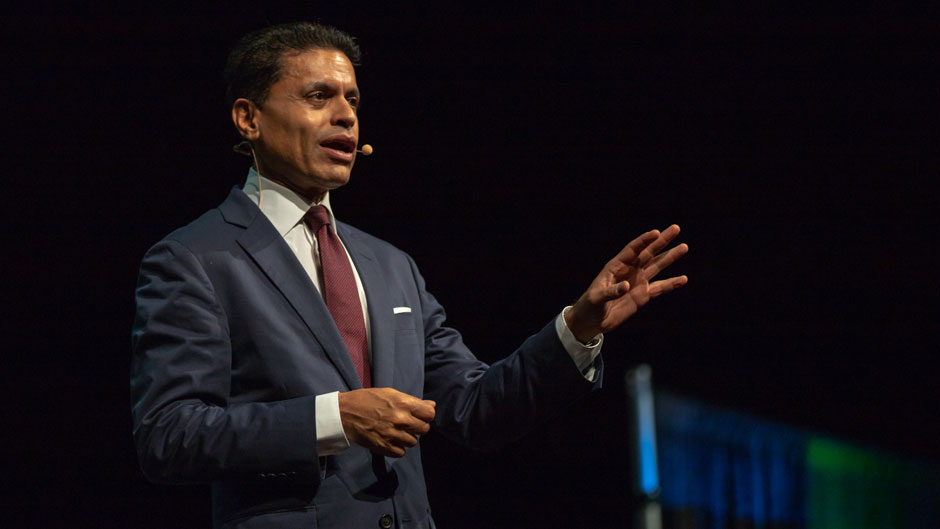CNN correspondent and foreign affairs expert Fareed Zakaria told students, faculty, staff and other members of the community Monday night that the 2016 elections highlighted the tense divisions in the United States, but that there are ways to unite America so that it will continue to be a place where people emigrate with the same hopefulness he felt as a young 18-year-old coming from India.
Tracing the history of the U.S. throughout the past 40 years, Zakaria said the political fissures today have an economic basis. The rise of global industrialization, coupled with the advent of technology have both dramatically affected the nation’s economy and American workers are struggling to keep up with the changes.
“You’ve had these two movements — globalization and information revolution — that have affected a certain group of people…people who have historically made their living with brawn rather than brain,” said Zakaria, who was on campus Monday evening at the Watsco Center as part of the University of Miami’s Northern Trust Lecture Series and 2018 Fall Convocation. “Those jobs are being done by machines, or they’re being done in China. And that reality has had not just an effect in the United States, but in the entire western world.”
Although he believes that those two factors have caused many of America’s struggles, often politicians are making “villains” of immigrants and people’s personal beliefs because it is easier than addressing the real problems, Zakaria said.
Yet, Zakaria said there are ways that America can stay competitive. First, he said the single biggest divide between a person’s economic prospects today than in the past is a college education.
“If we are living in a knowledge economy…we have to make sure that more Americans can get an education,” he said, adding that the U.S. and its companies should also focus more on continuing education. “The kids who are graduating from [college] today… in ten years will be working for a company that hasn’t been founded today and might even be working in an industry that doesn’t exist today.”
Another way to improve the country would be for the American government to invest more heavily in infrastructure, and to stop “living off the seed capital of fast investments,” Zakaria said.
“It used to be that American infrastructure was the envy of the world… that is no longer true,” he said, lamenting the constant airport delays and shoddy commuter trains here. “The future is being invented, but it is being invented in China and that doesn’t need to happen.”
He added that infrastructure does not just include transportation, but technology, and while the U.S. government did invest in forming the Internet and global positioning systems (GPS), it is still lacking behind its Asian counterparts on things like artificial intelligence and green technology.
Lastly, Zakaria mentioned the fact that since the U.S. has been an economic powerhouse for so long, young workers often lack the same drive that their parents may have had, but that these lucky Americans can learn a great deal from recent immigrants who often face harrowing journeys to live here.
“When we think about the future and how we restore the American dream, the question is not will these forces overwhelm us, but have these forces succeeded in disuniting us so much that we cannot come together with a sense of common purpose and make the common sense decisions that we all know need to be made,” Zakaria said.
Zakaria’s words did not fall short on students, who enjoyed listening to his analysis. Andrew Chum, a fifth year architecture major, said the foreign affairs expert was able to boil down complex topics to understandable examples.
“The importance of immigrants to the economic success of the country is something I agree with, but he was able to put it into words and explain it in a way I really got,” Chum said. “He also did a really good job of talking about the political climate in a way that was unbiased and inspiring, and I think that’s a difficult thing to do.”
Maria Estevez, a freshman health science and pre-medicine major, said that Zakaria’s comments about keeping up with emerging technology resonated with her because she often wonders how she will keep up with the latest advancements.
“I’ve been looking into biomedical engineering machines and wondering whether I will be able to use them in the next ten years,” she said. “So it’s important for our generation to hear this kind of speech.”
Zakaria is a well-known authority on international relations, gleaned through studying and reporting on politics for nearly three decades. He is currently the host of CNN’s “Fareed Zakaria GPS,” a weekly foreign relations program, writes a weekly column for The Washington Post, and serves as a contributing editor for The Atlantic.
Zakaria is also the author of three best-selling books, In Defense of a Liberal Education (2015), The Post-American World (2008) and The Future of Freedom (2003). Prior to his current positions, Zakaria was editor-at-large at Time magazine, the editor of Newsweek International and at 28, served as the youngest managing editor at Foreign Affairs. He has also received numerous awards for his reporting in print and on television.
Zakaria earned his bachelor’s degree at Yale University and earned his Ph.D. in political science from Harvard.

